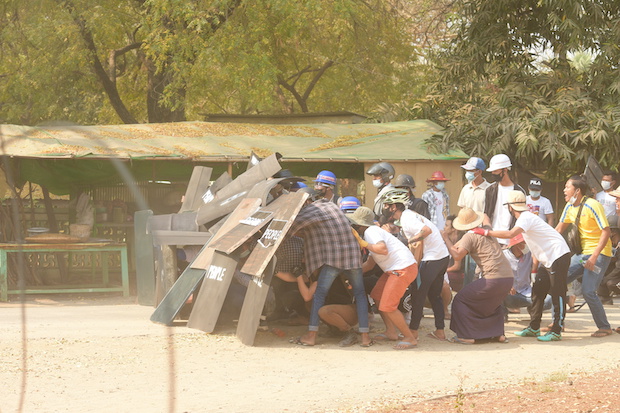COLUMNISTS-COMMENTARY: Asean, once again, don’t look away
Protesters create a shield formation in Nyaung-U, Myanmar, March 7, 2021, in this still image from a video obtained from social media by Reuters.
.


The military coup in Myanmar that overturned the election results and put the country’s leader Aung San Suu Kyi in house arrest is a shocking, if unsurprising, reminder that even as the pandemic rages, political strife continues around the world and the pandemic itself is used to enact and perpetuate authoritarianism. As the harrowing scenes unfold, we can only express outrage over this turn of events: No country deserves to be ruled by force, and no country deserves to be deprived of their elected leaders.
But while we express solidarity with the people of Myanmar in their bid for more democracy and less tyranny, we are also reminded of the Rohingya people and their continuing predicament. In September 2019, we visited Kutupalong near the Bangladesh-Myanmar border — one of the world’s largest refugee camps — and saw first-hand the suffering of men, women, and children, many of whom were driven away by the mass violence that involved Myanmar’s armed forces, the Tatmadaw.

Now that the Tatmadaw has seized power — on top of the authority they never really forfeited—what is to become of the Rohingya in light of these disconcerting developments?
The Rohingya people living in Myanmar (and beyond) are already expressing heightened anxiety and fear, as a coup means the country will be back to square one after having made some progress toward democracy. Even during the so-called “quasi-democratic” period, there was no significant improvement in the Rohingya crisis. Now with the coup, the situation can easily deteriorate. In the worst scenario, violence can recur. In the best scenario, the old tensions will remain with no meaningful step forward, thus diminishing the hope for hundreds of thousands of the Rohingya diaspora worldwide to be able to return home.
The coup is also likely to affect the current trial in the International Court of Justice (ICJ) that Myanmar is facing as a result of the mass killings and displacement of the Rohingya. Given that the “new government” is more intimately tied to the Rohingya conflicts and genocide, they will likely not appear before the ICJ to testify, or even show the slightest interest to engage with the judicial process. As a result, Myanmar will be further isolated and the Rohingya’s hope for redress will be further dimmed.
On the other hand, this could be a turning point for the peoples of Myanmar: Perhaps the pro-democracy protesters and the Rohingya community will now see that they actually have a common enemy, the Tatmadaw, whose brutality toward ethnic minorities is now being unleashed upon the rest of the country. Not only that—the two sectors also share similar aspirations: greater transparency, power-sharing, and respect for people’s voices. There are certainly many lessons to learn from what is happening, but the most profound is that the people of Myanmar, including the Rohingya, must unite to save the country. To do this, they must look past ethnic and cultural differences and work toward building a peaceful and inclusive democracy.

On the other hand, Asean nations, especially our leaders, have a great responsibility to side with the peoples of Myanmar as well as their legitimately-elected representatives. The current responses from Asean governments not only fall short of expectations, but also reflect division and a lack of moral courage. While Singapore, Indonesia, and Malaysia expressed “concerns” over the situation, Thailand and Cambodia regarded it as an “internal matter,” and the Philippines shamefully dissociated from the UNHRC resolution on the Myanmar crisis. Others have yet to take a stand.
This responsibility extends to the Rohingya people, whose statelessness and forced exodus should never have been condoned in the first place. Perhaps we can draw inspiration from the African Union, which did not allow misguided and often self-serving concepts like “sovereignty” and “noninterference” to get in the way of their decision to suspend Egypt from all its activities after the military coup in 2013. Principles, not politics, must govern Asean. Indeed, only a principled stand against the perpetrators of the Myanmar coup can do justice to Asean’s vision of a community “living in peace, stability and prosperity.”
After coming back from our Kutupalong trip in 2019, we pleaded for Asean not to look away. Today, in the wake of the unlawful coup in Myanmar, we plead again: Asean, don’t look away.
* * *

Raudah Yunus is a researcher, writer, and social activist based in Kuala Lumpur. Gideon Lasco is a physician, anthropologist, and Inquirer columnist based in Manila.











